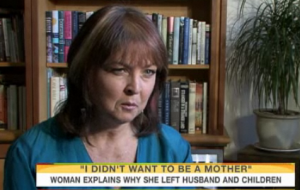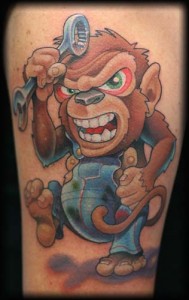 Here at DadWagon, we often tend to ignore the debates and bitchy arguments that embroil the rest of the parenting blogosphere. Mostly, that’s because we are barely literate, and reading through the inanity on “Mommies on Mommies (Mommies)” and “Dude! I’m an Effing Dad!” give us headaches.
Here at DadWagon, we often tend to ignore the debates and bitchy arguments that embroil the rest of the parenting blogosphere. Mostly, that’s because we are barely literate, and reading through the inanity on “Mommies on Mommies (Mommies)” and “Dude! I’m an Effing Dad!” give us headaches.
But sometimes an issue is so perplexing that we—or at least I—can’t help but weigh in. Today that issue is novelist Rahna Reiko Rizzuto, whose memoir, “Hiroshima in the Morning,” apparently tries to explain why, after a research trip to Japan in 2001, she left her husband and, more important, gave up primary custody of her kids, ages 3 and 5.
I say “apparently” not just because I haven’t read the book (that whole barely literate thing) but also because I’m not entirely sure why this has stirred such violent debate. For one thing, the book came out way back in September, although I understand that her recent appearance on the Today show and her condensed essay version of the book, “Why I Left My Children,” which showed up last week on Salon, might have something to do with the renewed interest. Oh, also, it’s been nominated for a National Book Critics Circle award. Okay, fine.
In any case, I hope her book is better than her Salon essay, which is about as sloppily written as anything you’ll find on the Internet. For one thing, she never actually says, in concrete terms, what she didn’t like about being a mother, except that she never wanted to be one. (She only had kids because their father, whom she’d been with for 20 years, since she was 17, had begged.) Rather, her opposition to kids is entirely abstract:
I was afraid of being swallowed up, of being exhausted, of opening my eyes one day, 20 (or 30!) years after they were born, and realizing I had lost myself and my life was over.
…
My problem was not with my children, but with how we think about motherhood. About how a male full-time caretaker is a “saint,” and how a female full-time caretaker is a “mother.” It is an equation we do not question; in fact we insist on it. And we punish the very idea that there are other ways to be a mother.
The validity of this is all very debatable, but I’ll let the guys over at FathersandFamilies.org handle this one:
It’s true that people often take for granted a mother who stays at home with the kids and see as special a father who does. That’s the side of the issue that Rizzuto likes to look at; the side she wants to ignore is that those same fathers are often looked down on as poor providers and less than men by many people including the ones they’re married to. They’re the ones who are shunned as pariahs by the mothers at the park with their children.
And Rizzuto’s notion that ”we insist on” full-time mothers is pure nonsense. In fact, the vast majority of mothers do paid work and therefore aren’t full-time moms. Surely Rizzuto is aware of this well-known fact.
But again, this is a woman who wants us to believe that she either didn’t have a choice or didn’t know she had a choice about having children or not. This was in the mid-to-late 90s. Where’d she been for the previous 25 years or so?
The point being that Rizzuto sees herself as more passive, more at the mercy of certain social winds than most women. Stated another way, my guess is that most women in this country have a firmer grasp of the need to strike a sensible work/family balance than Rizzuto did.
Well said, Fathers. Now, what’s my beef with Rizzuto?
Rahna Reiko Rizzuto is a fake.
That is, she’s marketing herself as a Mother Who Left Her Children. The reality, as she explains in the essay and presumably the book, is that when she left her family, she moved down the street from them and, while she gave up primary custody, continued to be a regular presence in their lives.
In my part-time motherhood, I get concentrated blocks of time when I can be that 1950s mother we idealize who was waiting in an apron with fresh cookies when we got off the school bus and wasn’t too busy for anything we needed until we went to bed. I go to every parent-teacher conference; I am there for performances and baseball games. My former husband is there too. Though it was not easy for him, he has made it possible for me to define my own motherhood, and for our sons to have a life of additions, rather than subtraction, of a relative peace, rather than constant accusation.
In other words, she hasn’t really left her kids at all. But, had she titled her Salon piece “Why I Left My Husband” or marketed herself as the woman who left her “family” (rather than her kids) to find herself and craft an independent identity, she wouldn’t be anywhere near as newsworthy. Of course, she wants it both ways, which is why we get the incendiary title followed by the not-very-incendiary fact that she remained extremely close to them.
(Hey, Rahna, if you really want to abandon your kids, take a page from this dad’s playbook. Or this one. Or this one.)
Rizzuto’s fakery reminds me a lot of All-Star Mommy Marketer Amy Chua—yes, the Tiger Mom. Like Rizzuto, Chua wants to have it both ways, to lure you in with sensationalism and then backtrack to say it’s not all that bad, maybe even satire, and then once again insist on the sensationalism. The reality of life, for both women, is probably too tawdry and dull to admit (or for a publisher to print). And so they play on our gullibility, and our hunger to either approve or condemn the parenting choices of other people. Is Rahna Reiko Rizzuto an evil bitch for leaving her kids? Or a feminist saint? It doesn’t really matter to me either way. But I will tell you one thing: She’s a brilliant self-publicist.
Or maybe it’s her agent.



